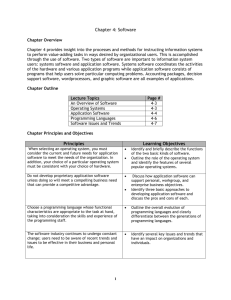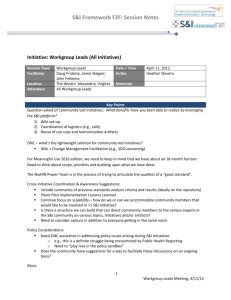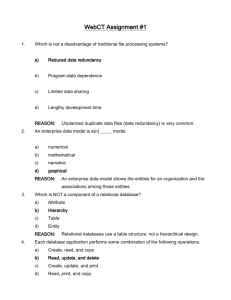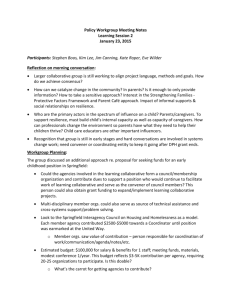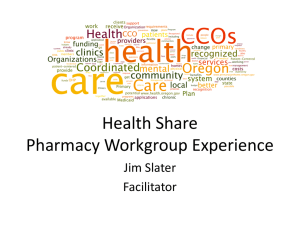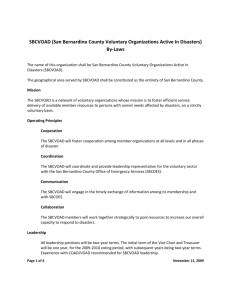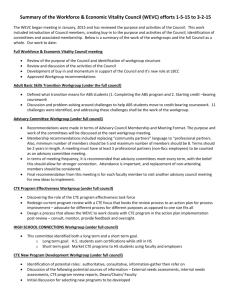TRITONLINK EXECUTIVE COMMITTEE
advertisement
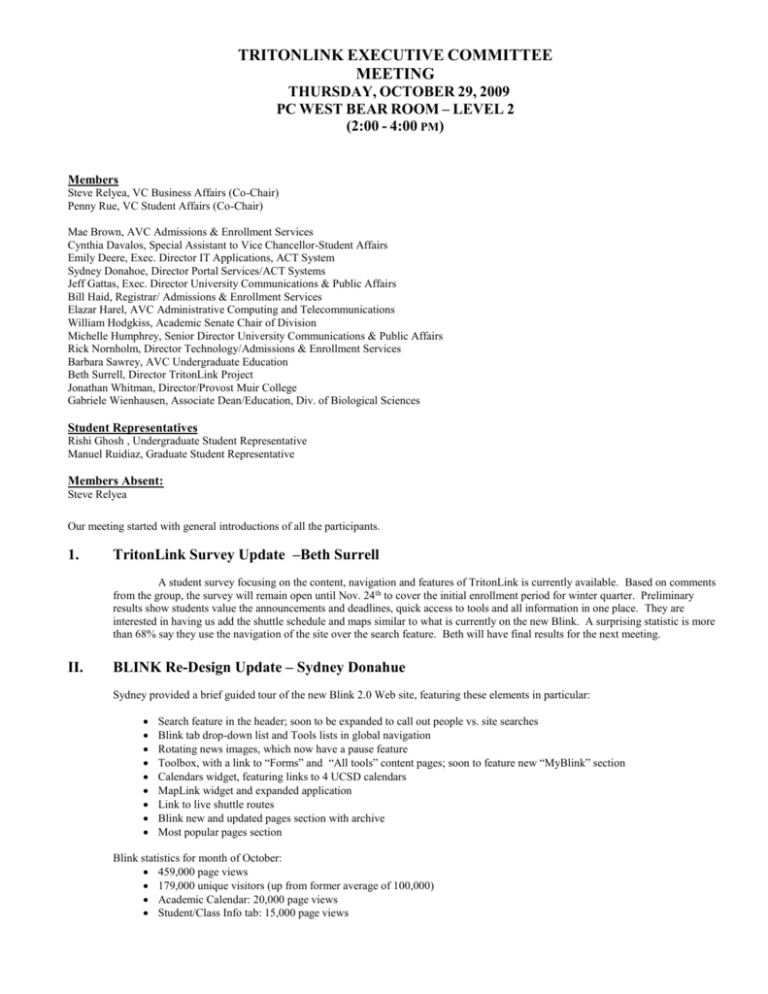
TRITONLINK EXECUTIVE COMMITTEE MEETING THURSDAY, OCTOBER 29, 2009 PC WEST BEAR ROOM – LEVEL 2 (2:00 - 4:00 PM) Members Steve Relyea, VC Business Affairs (Co-Chair) Penny Rue, VC Student Affairs (Co-Chair) Mae Brown, AVC Admissions & Enrollment Services Cynthia Davalos, Special Assistant to Vice Chancellor-Student Affairs Emily Deere, Exec. Director IT Applications, ACT System Sydney Donahoe, Director Portal Services/ACT Systems Jeff Gattas, Exec. Director University Communications & Public Affairs Bill Haid, Registrar/ Admissions & Enrollment Services Elazar Harel, AVC Administrative Computing and Telecommunications William Hodgkiss, Academic Senate Chair of Division Michelle Humphrey, Senior Director University Communications & Public Affairs Rick Nornholm, Director Technology/Admissions & Enrollment Services Barbara Sawrey, AVC Undergraduate Education Beth Surrell, Director TritonLink Project Jonathan Whitman, Director/Provost Muir College Gabriele Wienhausen, Associate Dean/Education, Div. of Biological Sciences Student Representatives Rishi Ghosh , Undergraduate Student Representative Manuel Ruidiaz, Graduate Student Representative Members Absent: Steve Relyea Our meeting started with general introductions of all the participants. 1. TritonLink Survey Update –Beth Surrell A student survey focusing on the content, navigation and features of TritonLink is currently available. Based on comments from the group, the survey will remain open until Nov. 24th to cover the initial enrollment period for winter quarter. Preliminary results show students value the announcements and deadlines, quick access to tools and all information in one place. They are interested in having us add the shuttle schedule and maps similar to what is currently on the new Blink. A surprising statistic is more than 68% say they use the navigation of the site over the search feature. Beth will have final results for the next meeting. II. BLINK Re-Design Update – Sydney Donahue Sydney provided a brief guided tour of the new Blink 2.0 Web site, featuring these elements in particular: Search feature in the header; soon to be expanded to call out people vs. site searches Blink tab drop-down list and Tools lists in global navigation Rotating news images, which now have a pause feature Toolbox, with a link to “Forms” and “All tools” content pages; soon to feature new “MyBlink” section Calendars widget, featuring links to 4 UCSD calendars MapLink widget and expanded application Link to live shuttle routes Blink new and updated pages section with archive Most popular pages section Blink statistics for month of October: 459,000 page views 179,000 unique visitors (up from former average of 100,000) Academic Calendar: 20,000 page views Student/Class Info tab: 15,000 page views III. Academic Success Review Update – Beth Surrell Beth reviewed the revised content of the Academic Success pages. The collective effort of Patrick Velasquez, Agustin Orozco, Ed Spriggs and Karen Fisher helped get this new content up at the start of the Fall quarter. Karen continues to work with Agustin for weekly teasers and updates to keep the page fresh and drive students to the content from the Academics tab. IV. Student Feedback Update – Beth Surrell/Cynthia Davalos Beth and Cynthia suggested going to an open forum/focus group concept next year. This would allow us to identify key areas to focus on and allow broader access to students who would like to be involved. Cynthia and Beth will work this summer to draft a schedule for the 09-10 academic year. V. Status Update on Website Projects - Bill Haid Subject: Initial Progress Report from Electronic Grades Workgroup This is an initial progress report from the eGrades workgroup. On behalf of the workgroup, Bill Haid submitted this report to the TritonLink Executive Committee. He anticipates completing the specifications stage of the workgroup and submitting a proposal to you by the end of the year. Please contact me if you have any questions or wish to have additional information from me or the workgroup. Electronic Grades Workgroup - Initial Progress Report - September 30, 2009 Table of Contents 1. Executive Summary 2. Formal charge to workgroup 3. Workgroup roster 4. Schedule of meetings (past/future) 5. Project tool – SourceForge 6. Project scope a. System requirement template b. Process flow c. Step 3 document 7. High level project estimate 8. Timeline expectation a. System specifications complete by end of Fall 09 b. Project proposal to executives by end of Fall 09 9. Issues and resolution plans a. Sub-committees b. CEP topics for policy discussion/revision c. Process re-engineering opportunities 10. Review of other UC systems for issue solutions, shared perspectives 11. Executive review/approval to proceed – Jan 2010? Attachments A. Charge Letter B. Workgroup Roster C. Schedule of Meetings D. Overview of SourceForge E. Project Scope document F. High Level Design and Estimate Executive Summary The University of California, San Diego is the only campus in the UC system to not collect grades from faculty using a web-based electronic interface. Electronic grading systems have become the standard method for grade submission for institutions using integrated student information systems and web-based interfaces and with the ability to identify and authenticate faculty and individuals with associated roles. The fundamental support infrastructure is now or will soon be in place at UCSD to proceed with the development and implementation of electronic grade submission. Faculty and administrators have identified electronic grading as an application of interest with significant benefit in reduction of manual effort and improvement in workflow. With a great deal of enthusiasm and energy, the eGrades workgroup has begun its work in earnest to determine the specifications for developing electronic grade submission at UCSD. As described in this initial progress report, the workgroup is fully engaged in the activities necessary to achieve its expected results. Formal Charge To Workgroup In a joint letter from VC Steve Relyea and VC Penny Rue, the workgroup was charged on July 14, 2009 to work on the development and implementation of a web-based grade submission application. The project is being referred to as “eGrades” as a working name. A chair (Bill Haid, registrar) and eight other members were named to the workgroup. The workgroup was charged to produce this initial progress report by the end of Summer quarter 2009, and a project proposal no later than the end of Fall quarter 2009. A copy of the charge letter is attached to this report. (Attachment A) Workgroup Roster In addition to the chair and eight representative members named in the charge letter, other technical, functional and optional attendee members have been added to the workgroup roster. There are 19 members on the current roster. Additional persons may be brought in for special topic discussions or testing at later points. A copy of the current roster is attached to this report. (Attachment B) Schedule of meetings A small number of the current workgroup began meeting monthly in March in anticipation of the formal charge to this workgroup and to designate eGrades as a project in the ACT work plan. Formal workgroup meetings began on July 29 and are scheduled twice monthly throughout the summer and fall of 2009. A schedule of meetings is attached to this report. (Attachment C) Project Tool – SourceForge The workgroup has adopted SourceForge as the project tool used by ACT for tracking all documents and progress of this project. All members of this workgroup have been given access to SourceForge and permission to interact with this project. Tina Ivany and John Baker from ACT are the project administrators for SourceForge. This tool provides for document management, tasks and assignments for project members (such as document or process reviews), tracking of comments and feedback, creating and tracking of discussion threads and forums, and technical tools for the analysts and programmers at a later stage. The tool is proving to be very valuable to the workgroup and is helping to keep work, assignments and documents in good order. An overview of Source Forge is attached to this report. (Attachment D) Project Scope A template used by ACT has been created for documenting the project scope and system requirements for E-grades. The business case and description of the current and proposed process is based on the charge letter and the proof of concept presentation that was initially approved for this project. The workgroup is reviewing all sections of this document and currently focusing on general requirements, which will become the system specifications for the project. The general requirements are listed in three categories; committed, negotiable and out of scope. Combined with business process diagrams and descriptions of current and proposed process, the workgroup is focusing their efforts on reviewing and determining the system requirements by the end of the Fall 2009 quarter. A copy of the Project Scope document is attached to this report. (Attachment E) High Level Design and Estimate As part of the process for project resource planning, ACT has conducted a high level analysis of the system requirements as they are currently known and produced a high level design for the development and implementation of E-grades if approval is given. This high level design incorporates the specifications and processes as they are currently envisioned. ACT used this high level design to develop an estimate of time and resources to develop this project. At this point, the estimate for the core system requirements is roughly 9 person months with 3 FTE assigned from ACT for the features listed on pages 1 through 5 of the high level design document. This does not include the expected effort of functional and other campus staff. A copy of the high level design and estimate is attached to this report. (Attachment F) Timeline Expectation The workgroup is operating under a time line expectation of completing the specifications for electronic grading and presenting a project proposal by the end of Fall 2009. Pending project and resource approval, a timeline for the development and implementation of eGrades will follow. The workgroup is prepared to continue as a user-steering committee as the project moves into development. Issues and Resolutions Plans The workgroup is approaching the system specifications by examining current and proposed processes. Where clear consensus exists, the workgroup is documenting that consensus. Where questions exist, the workgroup is engaging in discussion, discovery, and research. Subcommittees are assigned to particular topics, such as incomplete grades. Some items are policy related and are being compiled for further review by the appropriate authorizing body, i.e., CEP or Academic Senate. Where possible, re-engineering of processes for electronic efficiency, process improvement, or simplicity are being considered. Other topics have been identified for discovery of how they are handled at other UC institutions. Review of other UC electronic grading processes Contacts with 8 other UC registrars have been established for details of their electronic grading processes. Resources such as training documents and web pages from the other UC’s have also been gathered and made available to the workgroup. Special attention is being paid to instructional and training plans from other UC’s which could be utilized in this project. Executive Review/Approval to Proceed It is anticipated that a project proposal will be submitted from this workgroup to the executive sponsors by the end of 2009. The proposal will include the project specifications and an estimate of resources, as well as a timeline for implementation. VI. Brief College Website Update – Jonathan Whitman Here is the monthly digest of the websites that went live in the Campus CMS for the month of October. October 16th Sixth College Redesign: http://sixth.ucsd.edu/ We worked with Sixth College to migrate their content by hand into the new campus-wide templates. October 28th Revelle College http://revelle.ucsd.edu/ With the launch of Revelle College, 4 of the 6 Colleges are now using the CMS to maintain their website. Many thanks to everyone involved to make this happen, especially: Jonathan Whitman (All Colleges and Ringleader) Greg Goldman (All Colleges and Master CMS Trainer) Amy Herold (Roosevelt) Shamara Madrid (Warren) Chen Ming Chen (Warren) Marita Beiner (Revelle) Lynne McMullin (Sixth) Shannon Sloan (Sixth) Hopefully Muir and Marshall will one day decide to join the club! We are actively working with the following groups to bring their sites into the CMS: Ethnic Studies Dept. Literature Dept. Academic Internship Program Center for Iberian and Latin American Studies Division of Biological Sciences Division of Physical Sciences Philosophy Dept. Women’s Center Retirement Association Get the Latest on the CWO… You can always get updates by going to: http://cwo.ucsd.edu/ Or by following us on Twitter at http://twitter.com/campusweboffice VII. Student Systems Advisory Committee Review – John Baker/Rick Nornholm This handout represents screen shots of a new Web site that will be used to manage requests related to functional changes in our academic systems. This Web site was developed using a 3rd party product that ACT uses to manage projects and internal work. All three committees chartered to manage and guide systems related to student systems (Academic Applications Response Team, Student Systems Advisory Committee, and the TritonLink Executive Committee) will use this site to review, prioritize, and disposition requests. The “rollout” of this site will be first to the Academic Applications Response Team, then to the Student Systems Advisory Committee, and finally to the TritonLink Executive Committee. Page 1 Meeting ended at 3:30 PM
